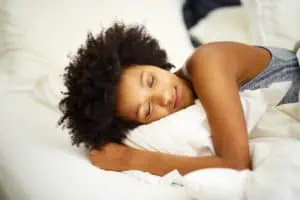
Most of us have joked about needing our beauty sleep, but is beauty sleep a real thing? When it comes to the skin, the answer is an unequivocal yes.
While you log the recommended seven to nine hours of sleep a night, your skin gets busy repairing the damage it incurred during the day. The connection between sleep and beauty is so strong that a few nights of scant sleep can noticeably affect your appearance.
In one small study, getting only four hours of sleep significantly reduced skin hydration. After four nights of sleep deprivation, skin texture worsened. Skin’s elasticity — its ability to stretch and snap back into place — was affected most of all by lack of sleep. When skin loses elasticity, it can look wrinkled, saggy or leathery.
How beauty sleep works
During the day, your skin is subject to a variety of assaults, including the sun’s ultraviolet (UV) rays, which damage the DNA in skin cells, leading to premature aging and potentially, skin cancer. Air pollution is also linked to prominent signs of aging, such as pigment spots and wrinkles. Other environmental stresses that affect the skin include smoking and exposure to certain chemicals.
Fortunately, a number of processes occur during sleep or after sleep that enables your skin to tackle the damage.
Growth hormone production
Shortly after you fall asleep, your body begins secreting somatotropin, also known as human growth hormone (hGH), which plays a crucial role in the development, maintenance, and repair of skin. Notably, hGH is required for the production of collagen, a protein found in the skin that makes it look plump and youthful.
Increased blood flow
Sleep promotes blood flow to the skin, making it look healthier and giving it an attractive flush. When blood flow is compromised from lack of sleep, you can end up looking pale. In addition, blood can collect under the eyes, causing dark circles. The fluid that builds up on the eyelids and orbits (eye sockets) can leave you with puffy eyes.
Reduced cortisol production
A good night’s sleep helps keep a lid on daytime production of cortisol, the “stress hormone.” Lack of sleep, on the other hand, may cause your body to produce more cortisol. Too much cortisol can affect your skin’s appearance in many ways, causing acne breakouts, dryness and destruction of collagen.
9 tips for getting more beauty sleep
To wake up looking refreshed, get enough good-quality sleep. Harder than it sounds? Try these tips.
1. Create a sleep schedule
Aim to go to bed and wake up at the same times every day. Sleeping late on your days off is tempting, but following a consist sleep routine, even on weekends, makes it easier to fall asleep at the right time, leaving yourself enough hours to get the ZZZs you need. If you’ve been staying up late, start going to bed earlier in 15- to 30-minute increments over several days until you reach a bedtime that allows you to get sufficient shuteye.
2. Develop a bedtime routine
They’re not just for toddlers! Start winding down for bed at least 30 minutes beforehand to get in sleep mode. Do relaxing activities such as stretching, reading or practicing deep breathing. Avoid any activities that can keep you alert, including looking at your computer, cell phone or tablet. Screens emit blue light, which can interfere with your body’s production of melatonin, the hormone that tells your body it’s time to sleep.
3. Keep your bedroom dark and quiet
Light can disrupt your circadian rhythm, which controls your sleep-wake cycle. Wear a sleep mask or put up light-blocking curtains to keep your room as dark as possible. Tune out noise by running a fan or white noise machine or wearing earplugs.
4. Adjust the temperature
Feeling too hot or too cold can interfere with sleep. Studies show that in general, the ideal temperature for sleep is around 65°F, though your ideal may be different.
5. Nap the right way
If you need a nap, take it in the early afternoon and limit it to 20 minutes. Long, late afternoon naps can make it harder to fall asleep at night.
6. Make some lifestyle changes
Certain habits can make it harder to fall asleep at night. These include eating big, spicy or fatty meals late at night, drinking caffeine late in the day, drinking alcohol before bed, smoking, and being sedentary.
7. Take a morning walking in the sunshine
Exposure to sunlight early in the day can help you sleep at night.
8. Use your bed only for sleep and sex
Doing work in bed can make your brain associate bed with work, which won’t help you fall asleep when the time comes.
9. Use sleep medications only as directed
It’s safe to take an over-the-counter sleep medication, such as ZzzQuil or Unisom, for the occasional bout of insomnia, but these drugs aren’t intended for long-term use. Take them too often and you may build up a tolerance, which means they won’t work as well. If you regularly have trouble falling asleep, see your doctor.
Article Written By: Jessica Brown, a health and science writer/editor based in Nanuet, New York. She has written for Prevention magazine, jnj.com, BCRF.org, and many other outlets.





